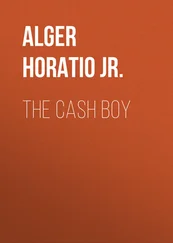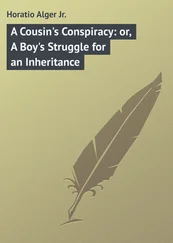Horatio Alger - The Telegraph Boy
Здесь есть возможность читать онлайн «Horatio Alger - The Telegraph Boy» — ознакомительный отрывок электронной книги совершенно бесплатно, а после прочтения отрывка купить полную версию. В некоторых случаях можно слушать аудио, скачать через торрент в формате fb2 и присутствует краткое содержание. Жанр: foreign_children, literature_19, foreign_antique, foreign_prose, на английском языке. Описание произведения, (предисловие) а так же отзывы посетителей доступны на портале библиотеки ЛибКат.
- Название:The Telegraph Boy
- Автор:
- Жанр:
- Год:неизвестен
- ISBN:нет данных
- Рейтинг книги:3 / 5. Голосов: 1
-
Избранное:Добавить в избранное
- Отзывы:
-
Ваша оценка:
- 60
- 1
- 2
- 3
- 4
- 5
The Telegraph Boy: краткое содержание, описание и аннотация
Предлагаем к чтению аннотацию, описание, краткое содержание или предисловие (зависит от того, что написал сам автор книги «The Telegraph Boy»). Если вы не нашли необходимую информацию о книге — напишите в комментариях, мы постараемся отыскать её.
The Telegraph Boy — читать онлайн ознакомительный отрывок
Ниже представлен текст книги, разбитый по страницам. Система сохранения места последней прочитанной страницы, позволяет с удобством читать онлайн бесплатно книгу «The Telegraph Boy», без необходимости каждый раз заново искать на чём Вы остановились. Поставьте закладку, и сможете в любой момент перейти на страницу, на которой закончили чтение.
Интервал:
Закладка:
"I think it's almost as bad as stealing to buy bread, or anything else, and give what isn't worth anything for it. You might as well give a piece of newspaper."
Though Frank was unquestionably right he did not succeed in making a convert of Dick Rafferty. Dick was a pretty good boy, considering the sort of training he had had; but passing bad money did not seem to him objectionable, unless "a fellow was cotched," as he expressed it.
"Well, what are you going to do now?" asked Dick, after a pause.
"I guess I can get a living by selling papers."
"You can get as good a livin' as old Mills gave you. You'll get a better bed at the lodgin'-house than that heap of rags you laid on up there."
"But there's one trouble," continued Frank, "I haven't any money to start on. Can you lend me fifty cents?"
"Fifty cents!" repeated Dick. "What do you take me for? If I was connected with Vanderbuilt or Astor I might set you up in business, but now I can't."
"Twenty-five cents will do," said Frank.
"Look here, Frank," said Dick, plunging his hands into his pocket, and drawing therefrom three pennies and a nickel, "do you see them?"
"Yes."
"Well, it's all the money I've got."
"I am afraid you have been extravagant, Dick," said Frank, in disappointment.
"Last night I went to Tony Pastor's, and when I got through I went into a saloon and got an ice-cream and a cigar. You couldn't expect a feller to be very rich after that. I say, I'll lend you five cents if you want it."
"No, thank you, Dick. I'll wait till you are richer."
"I tell you what, Frank, I'll save up my money, and by day after to-morrow I guess I can set you up."
"Thank you, Dick. If I don't have the money by that time myself I'll accept your offer."
There was no other boy with whom Frank felt sufficiently well acquainted to request a loan, and he walked away, feeling rather disappointed. It was certainly provoking to think that nothing but the lack of a small sum stood between him and remunerative employment. Once started he determined not to spend quite all his earnings, but to improve upon his friend Dick's practice, and, if possible, get a little ahead.
When guiding the blind man he often walked up Broadway, and mechanically he took the same direction, walking slowly along, occasionally stopping to look in at a shop-window.
As he was sauntering along he found himself behind two gentlemen,—one an old man, who wore gold spectacles; the other, a stout, pleasant-looking man, of middle age. Frank would not have noticed them particularly but for a sudden start and exclamation from the elder of the two gentlemen.
"I declare, Thompson," he said, "I've left my umbrella down-town."
"Where do you think you left it?"
"In Peckham's office; that is, I think I left it there."
"Oh, well, he'll save it for you."
"I don't know about that. Some visitor may carry it away."
"Never mind, Mr. Bowen. You are rich enough to afford a new one."
"It isn't the value of the article, Thompson," said his friend, in some emotion. "That umbrella was brought me from Paris by my son John, who died. It is as a souvenir of him that I regard and value it. I would not lose it for a hundred dollars, nay, five hundred."
"If you value it so much, sir, suppose we turn round and go back for it."
Frank had listened to this conversation, and an idea struck him. Pressing forward, he said respectfully, "Let me go for it, sir. I will get it, and bring it to your house."
The two gentlemen fixed their eyes upon the bright, eager face of the petitioner.
"Who are you, my boy?" asked Mr. Thompson.
"I am a poor boy, in want of work," answered our hero promptly.
"What is your name?"
"Frank Kavanagh."
"Where do you live?"
"I am trying to live in the city, sir."
"What have you been doing?"
"Leading a blind man, sir."
"Not a very pleasant employment, I should judge," said Thompson, shrugging his shoulders. "Well, have you lost that job?"
"Yes, sir."
"So the blind man turned you off, did he?"
"Yes, sir."
"Your services were unsatisfactory, I suppose?"
"He wanted me to pass counterfeit money for him, and I refused."
"If that is true, it is to your credit."
"It is true, sir," said Frank, quietly.
"Come, Mr. Bowen, what do you say,—shall we accept this boy's services? It will save you time and trouble."
"If I were sure he could be trusted," said Bowen, hesitating. "He might pawn the umbrella. It is a valuable one."
"I hope, sir, you won't think so badly of me as that," said Frank, with feeling. "If I were willing to steal anything, it would not be a gift from your dead son."
"I'll trust you, my boy," said the old gentleman quickly. "Your tone convinces me that you may be relied upon."
"Thank you, sir."
The old gentleman drew a card from his pocket, containing his name and address, and on the reverse side wrote the name of the friend at whose office he felt sure the umbrella had been left, with a brief note directing that it be handed to the bearer.
"All right, sir."
"Stop a moment, my boy. Have you got money to ride?"
"No, sir."
"Here, take this, and go down at once in the next stage. The sooner you get there the better."
Frank followed directions. He stopped the next stage, and got on board. As he passed the City-Hall Park, Dick Rafferty espied him. Frank nodded to him.
"How did he get money enough to ride in a 'bus?" Dick asked himself in much wonderment. "A few minutes ago he wanted to borrow some money of me, and now he's spending ten cents for a ride. Maybe he's found a pocket-book."
Frank kept on his way, and got out at Wall street. He found Mr. Peckham's office, and on presenting the card, much to his delight, the umbrella was handed him.
"Mr. Bowen was afraid to trust me with it over night," said Mr. Peckham, with a smile.
"He thought some visitor might carry it off," said Frank.
"Not unlikely. Umbrellas are considered common property."
Frank hailed another stage, and started on his way up-town. There was no elevated railway then, and this was the readiest conveyance, as Mr. Bowen lived on Madison avenue.
CHAPTER VII.
AN INVITATION TO DINNER
"Mr. Bowen must be a rich man," thought Frank, as he paused on the steps of a fine brown-stone mansion, corresponding to the number on his card.
He rang the bell, and asked, "Is Mr. Bowen at home?"
"Yes, but he is in his chamber. I don't think he will see you."
"I think he will," said Frank, who thought the servant was taking too much upon herself, "as I come by his appointment."
"I suppose you can come into the hall," said the servant, reluctantly. "Is your business important?"
"You may tell him that the boy he sent for his umbrella has brought it. He was afraid he had lost it."
"He sets great store by that umbrella," said the girl, in a different tone. "I'll go and tell him."
Mr. Bowen came downstairs almost immediately. There was a look of extreme gratification upon his face.
"Bless my soul, how quick you were!" he exclaimed. "Why, I've only been home a few minutes. Did you find the umbrella at Mr. Peckham's office?"
"Yes, sir; it had been found, and taken care of."
"Did Peckham say anything?"
"He said you were probably afraid to trust it with him over night, but he smiled when he said it."
"Peckham will have his joke, but he is an excellent man. My boy, I am much indebted to you."
"I was very glad to do the errand, sir," said Frank.
"I think you said you were poor," said the old man, thoughtfully.
"Yes, sir. When I met you I hadn't a cent in the world."
"Haven't you any way to make a living?"
"Yes, sir. I could sell papers if I had enough money to set me up in business."
Читать дальшеИнтервал:
Закладка:
Похожие книги на «The Telegraph Boy»
Представляем Вашему вниманию похожие книги на «The Telegraph Boy» списком для выбора. Мы отобрали схожую по названию и смыслу литературу в надежде предоставить читателям больше вариантов отыскать новые, интересные, ещё непрочитанные произведения.
Обсуждение, отзывы о книге «The Telegraph Boy» и просто собственные мнения читателей. Оставьте ваши комментарии, напишите, что Вы думаете о произведении, его смысле или главных героях. Укажите что конкретно понравилось, а что нет, и почему Вы так считаете.












